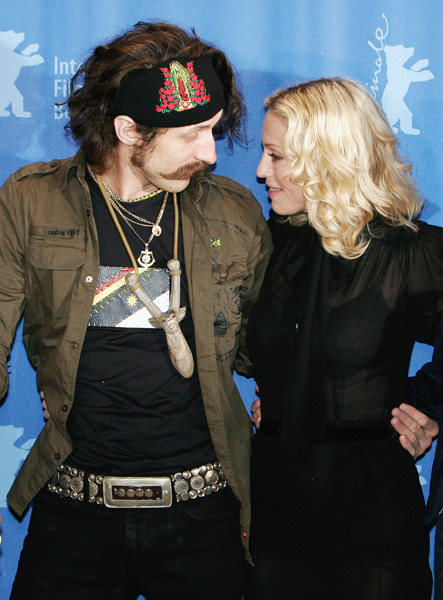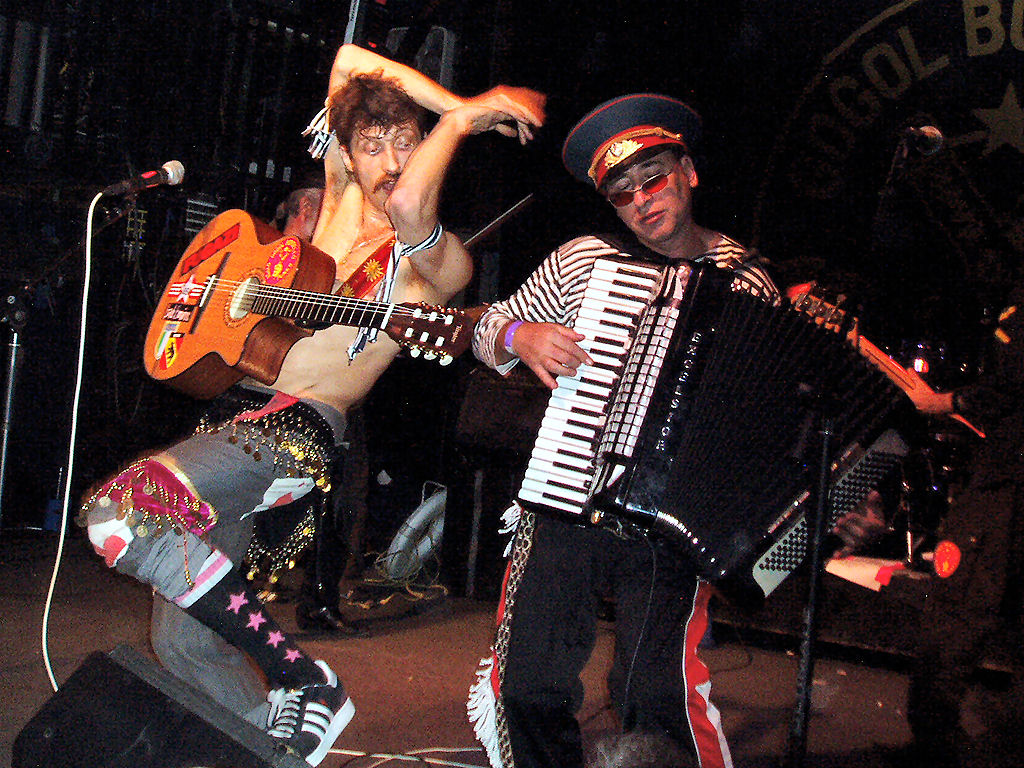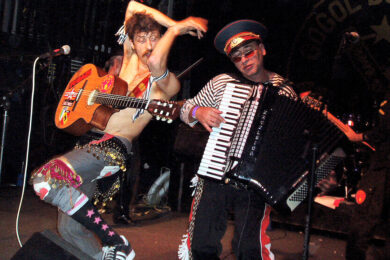There’s a riot going on.
A wackoid troupe of dancing, freaking, musical mavericks is pushing the festival into a welcome blast of technicolour. Gnarled vocals and a wild gypsy violin combine with a punk rock dynamic to turn the mosphit into a seething pile of flesh.
In a sea of indie-by-numbers bands Gogol Bordello are like a fucking riot. Sunday afternoon at a festival and the last six bands have droned away – each one armed to the teeth with music mag front covers and best band ever epitaphs, each one as thin on the talent front as their skinny chicken legs – then this riotous explosion of colour and sex rips the stage like it owns the place.
No wonder Gogol Bordello mopped up in the last few years. With a charismatic lunatic frontman, two hot go-go dancers and a band that understand the punk rock heart of great folk music Gogol Bordello have been taking over.
Their new release Live From Axis Mundi captures this show. On the DVD, you get the full fierce rush of how music can make you feel so alive – it’s the gypsy way. The other CD is stuffed full of out-takes and versions of band staples.
It’s a great package and one that marks the end of an era, as scarecrow frontman Eugene Hutz explains in his thick Ukrainian accent: "We are more about the music now, we were thinking of scaling down the show because in some ways it was detracting from the music."
Er, please don’t scale down the show Eugene! In these dismal times we need a florid riot. We already take you seriously without you having to be serious!
"The album is about closing the gypsy punk chapter for sure. It’s very clear which songs people go bananas for and it’s good to have the show captured. People say that Gogol Bordello has to have a fucking DVD unlike other bands whose DVDs are boring. Also I thought it was a good way to put out unreleased tracks and BBC sessions. It actually shows the amazing musical moments this band is able to create."
It’s been a long and strange journey for the frontman who grew up in Kiev with a musician father and Roma gypsy mother. He eventually washed up on the shores of the USA and mashed his previously ignored gypsy and East European roots with punk rock. Growing up as one of the few punk kids in Kiev he had loved The Fall, Joy Division and Neubauten, picking up their tunes from hand-me-down battered cassettes – the classic pre-internet music trade – all the time keeping quiet about his gypsy roots: "I didn’t tell anyone I had gypsy blood because the whole block would have asked us to leave."
Eugene’s life has taken some weird curves, from growing up near Kiev in the Ukraine to being the toast of the New York art world to breaking through with his band and appearing in a new movie Filth in Wisdom directed by Madonna.
"She just called me. I picked up the phone and there she was. She was already a fan of Gogol Bordello. Every time I played in London, there was a rumor that she was coming. We met naturally – there was no managers sorting it out. Pretty much everything fell into place. We had good vibes right away. I don’t think there was much as far as a script at the beginning. It was filmed gonzo style. It’s a fun movie – when I went to the early screening people were laughing and enjoying themselves."
Dipping a colourful toe into the mainstream, Gogol Bordello are readying a new album. They’ve enlisted one of the best producers in the world and the perfect choice for this attempt at the top of the greasy pole – enter the legendary Rick Rubin.
"My friend Rick was with us pretty much 5 days a week for the whole recording. It was exactly the time when the band was ready to work with someone like that – a musical guru. It ended up being the most creative experience in the studio. It comes from a serious commitment to the notion that music is a sacred art discipline. The way Rick likes to work is about getting rid of all the obstacles. It’s about the constructing. We pretty much had the best creative time in the studio. It opened up everybody’s channels to just rocking like fucking! Bonkers! Wild style!"
Rick Rubin, Madonna, world tours – it’s a long way from Eugene arriving in New York City as a refugee with no money and very few contacts, apart from his kinfolk who had always made him part of a micro community in every town in the world he visited.
Just being in New York was enough after a tangled upbringing in the Ukraine and several years schlepping around East Europe as a refugee: "It would be pretty funny to imagine that a punk rock kid in the Ukraine would listen to folk music at that time. When you discover punk rock you go to the most far away thing possible. You get a musical wanderlust. I was listening to the Clash, Joy Division, Mano Negra, The Fall. It was right around glasnost. Music was cassette driven, word of mouth, hand to hand driven. It was so under the radar that if you would see somebody on the subway in Kiev who had a remotely funny kind of funky haircut you would walk up and start talking to them – ‘Yeah man wanna go to my house and listen to the Sex Pistols?’, ‘Fuck yeah! Let’s go!’. There were a couple of places where sub cultural kids would hang out. It was so tight in a city of 3 million – we would have a couple of hundred of us punks – then there would be a couple of thousand of kids who would specialise in beating us up! We were outnumbered by everybody."
The folk music that would be so important in his later career was initially dismissed as being old man music before it found a purpose in unifying a nation of malcontents sick of the suffocating Soviet presence.
"When punk rock became strong in Russia and Ukraine a couple of bands reacted to the soviet union policy of eradicating all the differences in the republics. They were Russifying everybody. Everybody had to speak Russian so there were several bands who took it the other way round. I was influenced by that but not by any nationalistic reasons. In Ukraine, you could not find its cultural beauty. I was lucky to encounter it through my relatives. When I came to the United States as part of the diaspora I found a version of Ukraine culture there. The culture is always stronger when it is somewhere else like in America. That influenced me even more. These people cherished their culture and they had no reason to be nationalistic about it. So that was another major reason why we sound the way we sound."
Euege was exposed to a diverse range of music while growing up, from mainstream rock ‘n’ roll to gypsy tunes. "I was always aware of it. My mother was half Roma gypsy and she made me aware of it. We always had a neighbourhood party which was spirited in a lot of ways. I learned a lot of what I do from my father. He was in band. He would sing songs for hours – from Rolling Stones to Jesus Christ Superstar to Russian folk songs to prison songs. People would say, ‘What the fuck man! How can you remember all this shit?!’ It’s the same thing they ask me now! I saw a lot through childhood of him busting out the party through the block. My mother and uncle would contribute one thing or another – it was always pumping. Originally I thought when I was a kid that my parents really liked gypsy music. One day I was finally delivered the message that we were actually part of that community and had to mask it for political reasons. It was like we would not be living in the apartment we were living in if everybody had known that!"

The gypsy diaspora is not only crucial to this story but fascinating as well. The word ‘Gypsy’ derives from the word, Egyptian, because that’s where the 15th Century Europeans perceived that these people had come from: "Gypsy became important to me – as time went on living abroad I met gypsies from a lot of different tribes – France, Spain, Brazil, Greece, Sweden, The States… There is Roma almost everywhere – before I left I thought there were gypsy only in the Ukraine.
"There is a lot of under the radar intellectual activity that goes on in my community – thinkers and scholars – amazing musicians who remain closed off from the rest of the world community. They are scared of being stigmatised to this day and are very shy. Listen, after World War 2, which persecuted Jews and gypsies to the same extent, the Jews were able to get organised – they dealt with the holocaust by getting orginised and by fighting back and claiming their culture back. The Roma did it by dispersing and hiding away – that’s just the way it is. It’s growing back now. It’s amazing. It’s a very special, unique culture. If you are part of this culture it allows you to have a world wide family wherever you go. For example two years ago I moved to Brazil. By the time I got there I was welcomed as part of the family there by an amazing, old fashioned Roma family who – after spending some time playing music and talking about life – said, ‘Listen when you have babies in Brazil we are going to raise them for you!’ You don’t get stuff like this from other cultures…"
He adds: "Gypsy music is always a unique blend with local stuff but there was always a unifying emotional thread, it’s so bonkers you know! The music is always so emotional and ultra positive. It comes from the mentality of always living in the moment – for centuries all the wisdom of the world was to live in the moment, however nobody fucking did apart from the gypsies!"
The older Eugene is fascinated by his roots: "I went back to my community in Ukraine and we talked about all these things. Amazingly enough some of the Roma philosophers and historians from the Ukraine believe that the Roma came from Atlantis – I don’t know where they get it from. [laughs] Maybe unlike the Jewish people who claim back some land that’s Israel, the Roma can’t claim anything because it doesn’t exist but it’s always there in your heart."
His family was edged out of the Ukraine: "Technically we could have stayed but we were also on the radar. It sounds corny nowadays but because of the cold war my family was in the KGB files and my father was interrogated just like thousands of other people – put all that together and we were able to apply for refugee status and get the fuck out. We went to Poland, Hungry, Austria and Italy – the whole fucking thing…"
Getting to New York in the late 90s was the same thrill for Eugene as it had been for generations of immigrants arriving at the ultimate, immigrant city – living proof of the power of immigration: "I got there in 1998 and I almost lost my mind from happiness."
He started off by busking in the New York subway before putting the band together without a clear idea of where it could go: "It wasn’t like things suddenly happening. I started off playing in a subway. Things developed underground wise in 6 months I was making a record with Jim Sclavunos who plays with Nick Cave and the Bad Seeds but as far as further recognition went; well that was fucked up basically. No matter how much our fan base developed and how much of a cultural phenomena we were becoming there was always resistance from labels – especially indie labels. That was very ironic – the place were I actually experienced racism was not from the rednecks and not from the skinheads I lived with who were not Nazi skinheads – the actual snob racism I experienced was from the indie rock scene and the people in control of late 90s indie. They were not down with us even though we would outsell all their bands put together. What we got came from hardcore touring and people realising we were a song based band."
Their earliest supporters were, bizarrely, the New York art scene. At the same time they were getting adopted by the punk kids who recognised that East European folk was like a punk – a people’s music: "We were getting flown round the world to play galleries in Spain and Europe. It was great but one day I thought I didn’t start a band to play an art gallery. So we started to enter the rock & roll circuit and make it loud and clear that we were a rock & roll band."
With their impassioned delivery and great songs, they were quickly finding a space for themselves as the ragbag of various tribes that came to check them out exploded into a mass audience and now they seek another evolution: "In recent years we were able to strip down the stage show. We have got to a point in our evolution that we are able to join forces with Rick Rubin."
Eugene seals the first chapter off on this fascinating band’s existence and prepares to open the next one – where to next?



